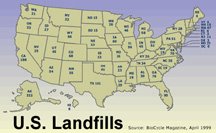Base plans for repair of landfill rejected
The San Diego Union-Tribune
CAMP PENDLETON, CA – First, Camp Pendleton officials angrily denied any problem with their Las Pulgas Landfill.
After being cited repeatedly by state regulators, they grudgingly admitted to having issues with the 17-acre site – but only small ones.
Then a base-commissioned study estimated it might cost $30 million to fix the $2.3 million dump, but also laid out plans for much cheaper repairs.
Now, the rocky history of Las Pulgas has hit a new low: The San Diego Regional Water Quality Control Board is flatly rejecting Camp Pendleton's turnaround plan for the landfill. It's also suggesting permanent closure of the site because the problems might be unfixable.
The dump, situated near the base's central area, was expanded in 1999 to hold decades' worth of trash. But shoddy construction caused the landfill's liner to rupture in numerous places, forcing Marine officials to close the site in 2003.
Base leaders have spent about half a million dollars to trap and store hundreds of thousands of gallons of hazardous waste – including radioactive material and heavy metals – that have gushed from the landfill.
State regulators fear such runoff could pollute drinking-water wells and aquifers located just a few miles from the dump. They have described the landfill as the greatest engineering failure of its kind in San Diego County history.
Last year, the Marines paid $151,500 to the consulting firm Tetra Tech Inc. to complete its study on potential fixes. The company took seven months to finish the report.
In January, Camp Pendleton officials chose a $5.5 million repair proposal from the options Tetra Tech presented. They sought to spread a liner on top of the roughly 250,000 cubic yards of garbage already in the landfill. In theory, the new cover would prevent rainfall and other sources of water from filtering through the existing trash and leaking through the first liner.
Any hope that water board officials would endorse the base's plan died just two paragraphs into the agency's 19-page review.
“The (study) contains very significant deficiencies in the level of technical information. . . . (It) fails to comply with minimum requirements,” said the document, which the board sent Friday to Camp Pendleton.
“They proposed something that they failed to provide rationale for,” said John Odermatt, a senior engineering geologist for the water board.
In a statement, Camp Pendleton said it was “coordinating with (board officials) to address their concerns.”
Tetra Tech did not respond to several requests for comment.
The water board wants Camp Pendleton to submit a new proposal that either details how the existing liner might be replaced or how the landfill might be closed indefinitely.
Camp Pendleton officials said they would comply with the mandate, although they didn't specify a timeline for doing so.
“In the end, I think they are going to find and fix all the (liner) holes or clean and close the landfill,” Odermatt said. Both of these repair projects were at the higher end of Tetra Tech's price estimates.
Odermatt said the Marine Corps is immune to most forms of pressure normally exercised by the board, including fines. That's because the military and other federal agencies are exempt from certain environmental regulations.
In an extreme case, the water board could go to court and seek a cease-and-desist order that would prevent Camp Pendleton from operating the landfill.













